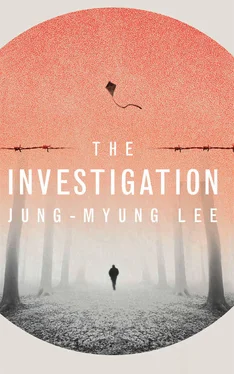
I heaved a deep sigh. ‘So you’re saying Sugiyama was violent because he felt guilty. He was trying to atone for betraying his comrades.’
Dong-ju ran a hand through his bristly hair. ‘He might not have thought about it that way, but yes, that’s what happened.’
‘That doesn’t make any sense.’
‘I believe he thought the torture he experienced caused everything that happened. If it weren’t for the torture, he wouldn’t have told them anything.’
‘What does that have to do with how he treated the prisoners here?’
‘Becoming evil might have been the only way for him to survive. Judas hanged himself after betraying Jesus,’ Dong-ju said cryptically. ‘But Sugiyama survived.’
I pondered Dong-ju’s words. So every time Sugiyama felt guilty, he remembered being tortured, and then he thought about his dead friends. An awful memory bred another evil; it was an unbreakable chain. ‘How could you possibly atone, if you keep doing bad things?’
‘I think he had to see with his own eyes that man is powerless in the face of pain. He had to assure himself that nobody could stand up to cruel treatment.’
I was having a hard time wrapping my head around all of it. ‘Did Sugiyama really tell the Soviets the location of his platoon?’
‘Nobody knows. He didn’t know. But he was still destroyed over it.’ Dong-ju shook his head.
‘I don’t think Sugiyama talked,’ I said quietly. ‘He should have realized that the Soviets were tricking him. They would have let him escape precisely because he didn’t talk. They must have followed him. And then, when he had led them there, they destroyed the platoon.’
‘What makes you think so?’
‘If he had told them, his platoon would have been killed much sooner. Then he wouldn’t have witnessed the attack. His remorseful conscience is what destroyed his soul.’
I still wasn’t certain if Sugiyama had been a good man, and I still didn’t know what to make of his death.
THE CHORUS OF THE HEBREW SLAVES
It was February. Dong-ju’s release date inched closer. But now he often forgot when he would be released.
Some time after Sugiyama’s death, Dong-ju stopped writing letters for the prisoners. One day I pulled aside a friendly Korean prisoner who’d frequently sent out postcards, to ask him why they’d stopped.
He sighed. ‘We need good news to send out a postcard. If it’s bad news, it’s better if our friends and family don’t know.’
But then why had all those Koreans asked Dong-ju to write postcards for them in the first place?
‘That man has a talent for writing the worst news in the most beautiful way. It could be so cold that it might kill you, and he would write: Thanks to the cold, I’m feeling invigorated. Even though there are so many of us crammed into our cells, he would write: Thanks to the tight quarters, we can survive the winter. He never lied. He just framed our truths in warm, kind words that reassured the reader. He helped us think about terrible things in a good way. That’s why so many of us went to him. I wonder if he’ll ever help us write postcards again.’
I didn’t have an answer.
The war limped on. There was nothing to eat, nothing to wear and nothing left over. People starved; fear suffocated them. But the prison was roiling with excitement. In a week there would be a concert; it was the biggest event in the history of the institution. Warden Hasegawa rushed about, from the auditorium to the yard to the administrative offices, while Maeda prepared to host high-level officials from Tokyo, the choristers focused on final rehearsals and Midori fine-tuned their voices. Some officials declined to come to Fukuoka amid the continuing air raids, but the Interior Minister and an army general would still be attending.
Dong-ju seemed revitalized as the concert approached. He knew it would be impossible to hear anything from his cell; it was too far from the auditorium. The noisy machinery in the work area would drown everything out.
Two days before the concert he came up with an idea. ‘Yuichi,’ he said, his eyes sparkling, ‘I know how I can hear it.’
‘How?’
‘The concert’s on Monday. I’ll volunteer to receive medical treatment that day!’
The infusion room was on the same floor as the auditorium, so he might be able to hear something. But his plan was dangerous; he might only become weaker.
I shook my head firmly. ‘Your medical treatment schedule is Tuesday and Friday. It can’t be changed.’
‘Yuichi! Please!’
I couldn’t refuse him. His memories were slipping away like sand pouring through open fingers. He would do anything to fill his failing mind with music. The next day, after I escorted the choristers to the auditorium, I headed to the infusion room. I kept stopping in the long corridor, wondering whether to turn back. Finally I opened the door to the room and reported to the puzzled doctor that a prisoner wanted additional infusions. ‘It appears that the medication is starting to work. The patient has recovered and he does not tire during labour.’
A look of disbelief flashed across the doctor’s face. He excitedly asked for the prisoner number. Three numbers circled my head. It took me a while to spit out the numbers. ‘645.’
‘Wonderful!’ the doctor cried. ‘Bring him here at two on Monday! We’ll conduct a careful observation.’
I turned to leave. Had I finally become a murderer?
I woke up on the morning of the concert to a blanket of snow that had fallen silently overnight. The prison yard looked like a piece of white paper. As the sun rose, I escorted the singers across the yard to the auditorium. Inside, dozens of guards were scurrying about under Maeda’s direction. The stage was carpeted in red. There were enough seats for 300. I lined up the choristers backstage and finished the head count. I looked at Midori. She led the final rehearsal, starting with simple individual vocalizations and organizing the men to then practise by voice part.
Some minutes past noon, a black car pulled up to the gates of the prison. Professor Marui, wearing a black tuxedo, got out. He immediately headed to the auditorium to inspect it. After the final stage check, he went into make-up. Black cars drove up to the main gates, spilling out men in tuxedos and dress uniforms and women in finery. They appeared uneasy about the unusual setting, but seemed oddly excited, too. Warden Hasegawa greeted each guest, smiling widely. Senior guards in well-ironed uniforms and nurses ushered the guests to the auditorium. The empty seats gradually filled. Then the concert began with everyone singing the ‘Kimigayo’. The stage lights were turned off and the curtain rose. Professor Marui, wearing tails, walked into the spotlight.
A guard checked the shackles around Dong-ju’s ankles before leading him out of the cell. They slowly proceeded towards the infirmary. The snow underfoot made angry grinding sounds and fluttered in the wind, but silenced the clanking of the shackles. As soon as they entered the infirmary building, Dong-ju could sense the expectation in the air. His footsteps became lively. A doctor greeted him with a smile in front of the infusion room and, as Dong-ju entered, he could hear a clear, sorrowful voice singing from far away:
Am Brunnen vor dem Tore
Da steht ein Lindenbaum:
Dong-ju closed his eyes.
The doctor spoke. ‘Prisoner number!’
‘645.’
Ich träumt in seinem Schatten
So manchen süßen Traum.
‘Name?’
‘Hiranuma Tochu.’
Und seine Zweige rauschten,
Читать дальше













